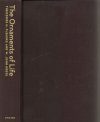![The Ornaments of Life The Ornaments of Life]()
Click to have a closer look
About this book
Contents
Customer reviews
Biography
Related titles
About this book
The average kilometer of tropical rainforest is teeming with life; it contains thousands of species of plants and animals. As The Ornaments of Life reveals, many of the most colorful and eye-catching rainforest inhabitants – toucans, monkeys, leaf-nosed bats, and hummingbirds, to name a few – are an important component of the infrastructure that supports life in the forest. These fruit-and-nectar eating birds and mammals pollinate the flowers and disperse the seeds of hundreds of tropical plants, and unlike temperate communities, much of this greenery relies exclusively on animals for reproduction.
Synthesizing recent research by ecologists and evolutionary biologists, Theodore H. Fleming and W. John Kress demonstrate the tremendous functional and evolutionary importance of these tropical pollinators and frugivores. They shed light on how these mutually symbiotic relationships evolved and lay out the current conservation status of these essential species. In order to illustrate the striking beauty of these "ornaments" of the rainforest, the authors of The Ornaments of Life have included a series of breathtaking color plates and full-color graphs and diagrams.
Contents
Preface
1 The Scope of This Book
2 Patterns of Regional and Community Diversity
3 The Resource Base
4 Patterns of Pollen and Seed Dispersal and Their Ecological and Genetic Consequences
5 Macroevolutionary Consequences of Pollen and Seed Dispersal
6 Phylogeny and Biogeography of These Mutualisms
7 The Pollination Mutualism
8 The Frugivory Mutualism
9 Synthesis and Conclusions about the Ecology and Evolution of Angiosperm-Vertebrate Mutualisms
10 The Future of Vertebrate-Angiosperm Mutualisms
Appendix 1: Overview of the Major Families of Avian and Mammalian Pollinators and Seed Dispersers
Appendix 2: Overview of the Major Families of Plants containing Species That Are Pollinated or
Dispersed by Birds or Mammals
References
Index
Customer Reviews
Biography
Theodore H. Fleming is professor emeritus of biology at the University of Miami in Coral Gables, Florida. W. John Kress is a curator and research botanist as well as director of the Consortium for Understanding and Sustaining a Biodiverse Planet at the Smithsonian Institution.
By: Theodore H Fleming(Author), W John Kress(Author)
588 pages, 13 plates with colour photos; colour illustrations, colour tables
"This lovely paperback presents a comprehensive and absorbing survey of coevolution and conservation in the tropics. It covers such interesting subjects as mutualism in pollination and frugivory, the phylogeny and biogeography of mutualism, and macroevolutionary consequences of pollen and seed dispersal. Printed on heavy glossy paper, filled with many full-colour photographs, diagrams, tables and data graphs, this meticulously researched book also includes two appendices, 74 pages of references, and separate indices listing subjects and species. This scholarly work can be used as a university-level textbook, as a reference, or as a guide for self-study."
- GrrlScientist, Guardian (UK)
"The most extensive synthesis of tropical plant-animal interactions ever published."
- The Plant Press: A quarterly newsletter from the Dept. of Botany and the U.S. National Herbarium
"Theodore H. Fleming and W. John Kress here bring together current knowledge of the ecology and evolution of vertebrate-plant mutualisms, from biogeography and energetics through species proliferation and conservation. They've analyzed the reciprocal 'fine-tuning' between bird-pollinated flowers and nectarivorous birds, or fruits and seed dispersers, on a worldwide scale and in the context of molecular-clock dated phylogenies, resulting in an unrivaled synthesis."
- Susanne Renner, Ludwig-Maximilans-Universität
"Theodore H. Fleming and W. John Kress provide an around-the-world tour of tropical flowers and fruits, and mutual dependency between the plants that produce them and the animals that visit them. The rich blend of natural history and evolutionary ecology yields many new insights about origins and importance of these 'ornaments' to tropical ecosystems. This book will spark the imagination and curiosity of anyone interested in the beauty of nature."
- Douglas Levey, National Science Foundation










































